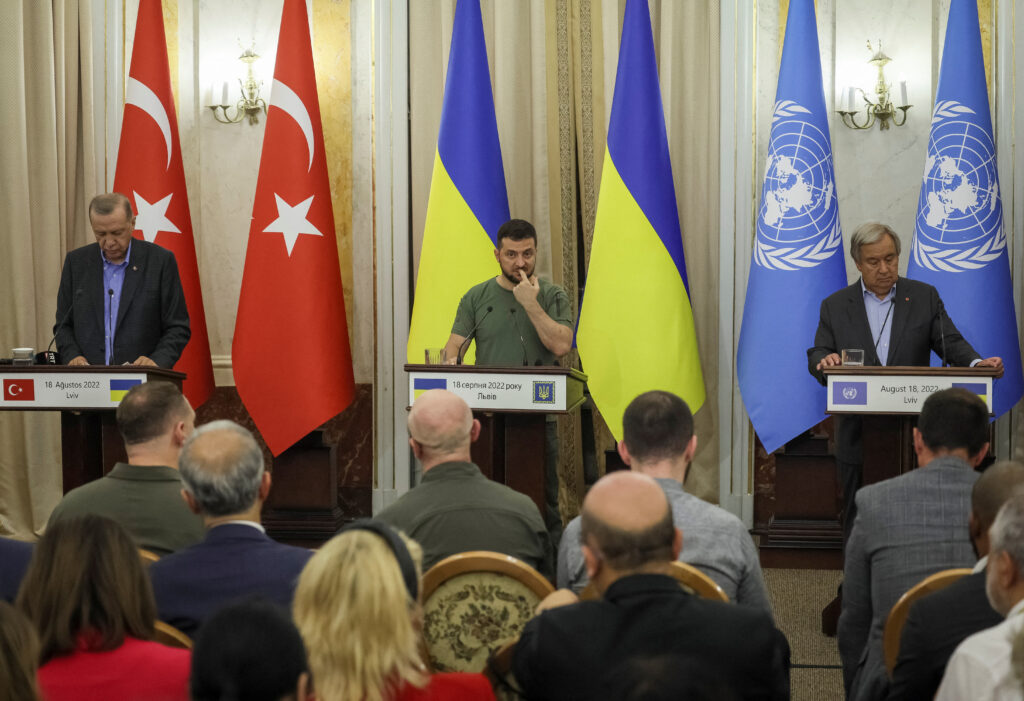UN Secretary-General Antonio Guterres said on Thursday he was gravely concerned by the situation at Europe’s largest nuclear power station after it came under shelling at the front lines in Ukraine.
Russia, which captured the Zaporizhzhia nuclear plant soon after its February 24 invasion of Ukraine, said it could shut down the facility – a move Kyiv said would increase the risk of a nuclear catastrophe.
Guterres, speaking to reporters after talks with Ukraine’s President Volodymyr Zelenskiy in the western Ukrainian city of Lviv, said military equipment and personnel should be withdrawn from the plant.
“The facility must not be used as part of any military operation. Instead, agreement is urgently needed to re-establish Zaporizhzhia’s purely civilian infrastructure and to ensure the safety of the area,” he said.
Moscow had earlier rejected as “unacceptable” international calls for a demilitarised zone around the plant, which is still operated by Ukrainian engineers under Russian occupation.
The power station sits on the Russian-controlled south bank of a huge reservoir; Ukrainian forces hold the north bank. Recent days have seen several incidents of shelling at the plant, which both sides blame on each other.
Ukraine also accuses Russia of using the plant as a shield for its forces to launch strikes across the reservoir on Ukrainian-held cities, which Moscow denies.
Reuters cannot independently confirm the military situation there or responsibility for shelling.
Zelenskiy said after meeting Guterres on Thursday that they had agreed parameters of a possible mission of the International Atomic Energy Agency to the plant.
“Russia should immediately and unconditionally withdraw its forces from the territory of Zaporizhzhia nuclear power plant, as well as stopping any provocations and shelling,” he said.
Earlier, he accused Russia of “nuclear blackmail”.
‘RADIATION DISASTER’
In Moscow, the defence ministry said Russia could shut the plant down if it came under further attack.
Ukrainian officials have accused Russia of planning to shut the plant to sever it from Ukraine’s power grid and switch it over to Russia’s – effectively stealing its output.
Ukrainian state nuclear energy company Energoatom said shutting down the plant would increase the risk of “a radiation disaster at the largest nuclear power plant in Europe”.
Disconnecting the complex’s generators from Ukraine’s power system would prevent them being used to keep nuclear fuel cool in the event of a power outage at the plant, it said.
Shutting down a nuclear power plant is a complicated operation that requires halting nuclear chain reactions while protecting fuel from heating up and causing a meltdown.
Russia’s defence ministry and Ukraine’s main intelligence agency both accused the other side of planning some form of incident at the nuclear plant as a “provocation” to take place during Guterres’ visit.
TALKS ON ENDING CONFLICT
Turkey’s President Tayyip Erdogan also took part in talks with Guterres and Zelenskiy in Lviv, saying afterwards they had discussed ways to end the conflict.
Erdogan said they had talked about using the positive atmosphere created by a deal brokered by the UN and Turkey to lift a Russian blockade of Ukrainian grain exports to revive peace negotiations that took place in Istanbul in March.
NATO member Turkey has maintained good relations with Russia, an important trade partner, and sought to mediate in the six-month-old conflict.
“Personally, I maintain my belief that the war will ultimately end at the negotiating table. Mr Zelenskiy and Mr Guterres have the same opinion in this regard,” Erdogan said.
He said they had also discussed the exchange of prisoners of war between Ukraine and Russia, and that he would later raise the issue with Russian President Vladimir Putin.
Relatives of Ukrainian troops who surrendered at the Azovstal steel factory in Mariupol under a UN-backed deal staged a demonstration during Guterres’s visit calling for more efforts to protect them.
Dozens of the Azovstal prisoners died in custody of Russian-backed separatists last month in a fiery blast at a prison. Kyiv called it a massacre and a war crime; Moscow accused Ukraine of having struck the prison with rockets, though it provided no explanation for why no guards were hurt.
After months in which Russian forces made modest territorial gains in heavy fighting in the east, front lines in Ukraine have been comparatively static in recent weeks.
Kyiv says it is preparing for a counterattack to recapture a swathe of southern territory, including Kherson province and neighbouring Zaporizhzhia, where the nuclear plant is located.
The war has killed thousands and forced millions to flee. Moscow says its aim is to demilitarise Ukraine and protect Russian-speakers on land that Putin says historically belongs to Russia.
Kyiv and the West call it an unprovoked war to conquer Ukraine and erase its thousand-year national identity.


